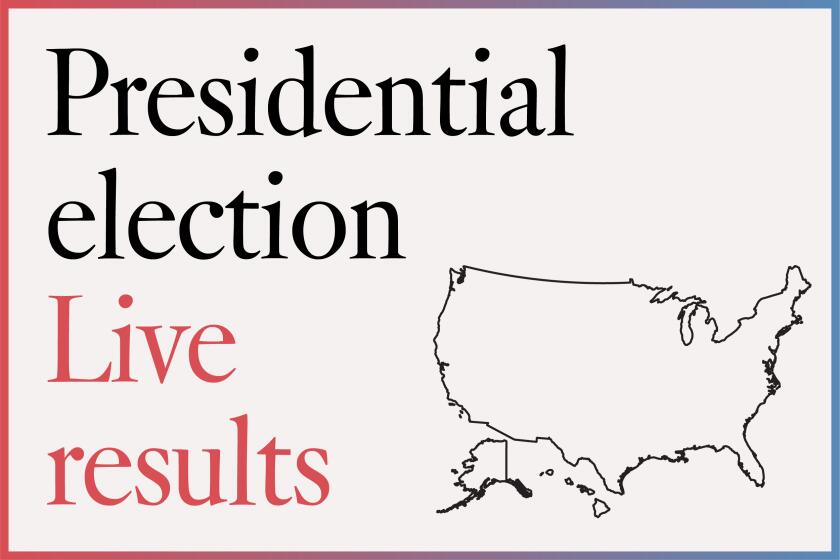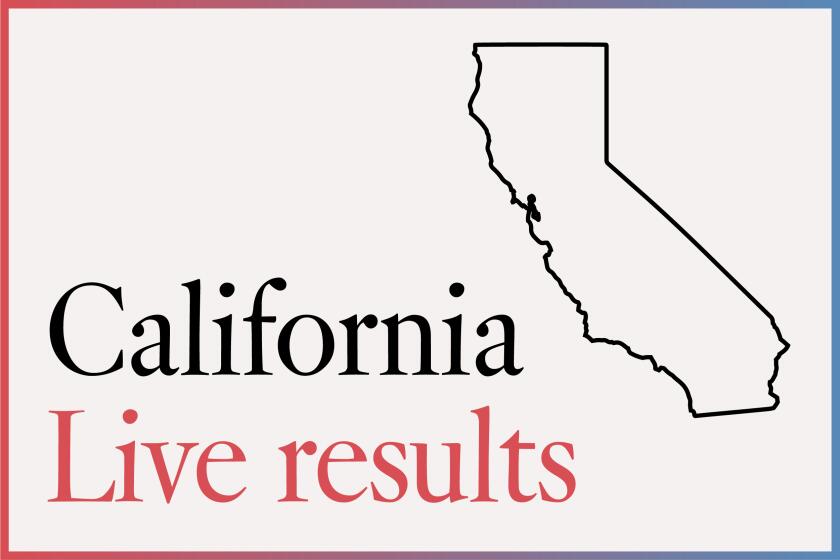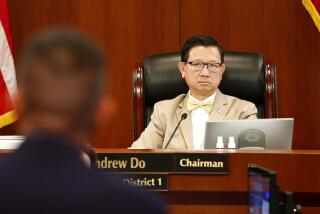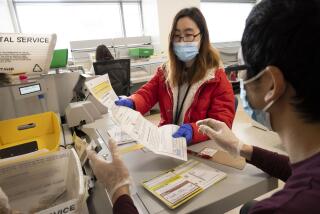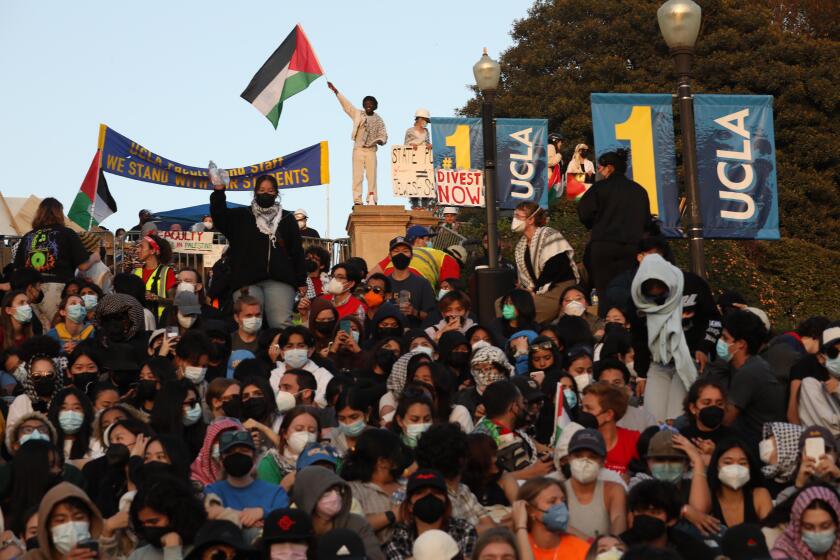Fake polling place or service to the community? Questions swirl around ‘ballot room’ in OC’s Little Saigon
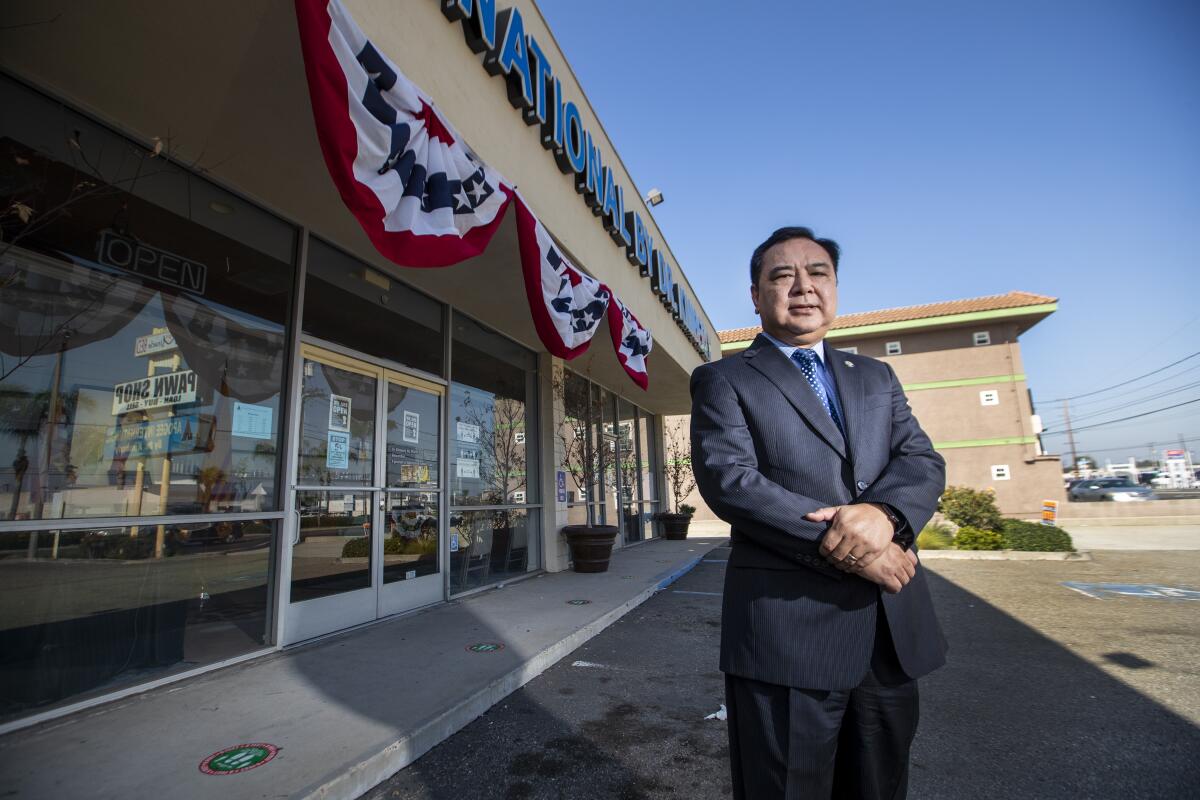
On Election Day, voters arrived at a strip mall in the Orange County enclave known as Little Saigon. “POLLING PLACE,” a large sign announced in Vietnamese. “Together, let’s vote.”
But the strip mall wasn’t an official vote center. The nearest one was just up the road, at a community center in Westminster.
The office was in fact the headquarters of Apogee International, a skincare company owned by Kimberly Ho, vice mayor of Westminster. The location doubled as Ho’s campaign headquarters for her ultimately successful bid for reelection to the City Council.
It’s not yet clear whether the voting site, which is under investigation by Orange County authorities, was in violation of any election laws. Some of those involved in politics in Westminster’s large Vietnamese community defended it Wednesday as a natural outgrowth of a robust political culture that goes to great lengths to encourage voting. Others questioned whether Ho’s campaign had gone too far.
Van Tran, an attorney for the campaign, said the site was providing a badly needed service to the local community, the largest population of Vietnamese expatriates outside Vietnam.
Tran and others say people in Little Saigon often turn to local elected officials like Ho for help with voting because they’re seen as trusted figures in the community.
Claims that the campaign was running a fake voting center were coming from agitators without any understanding of the operation, he said.
“Is it voting when you bring in your ballot to ask for help — then drop off your ballot with the campaign after they answer your questions?” he said. “How can you physically cast a vote when we’re not set up to do that? Everything that we do, we do it within the confines of the law.”
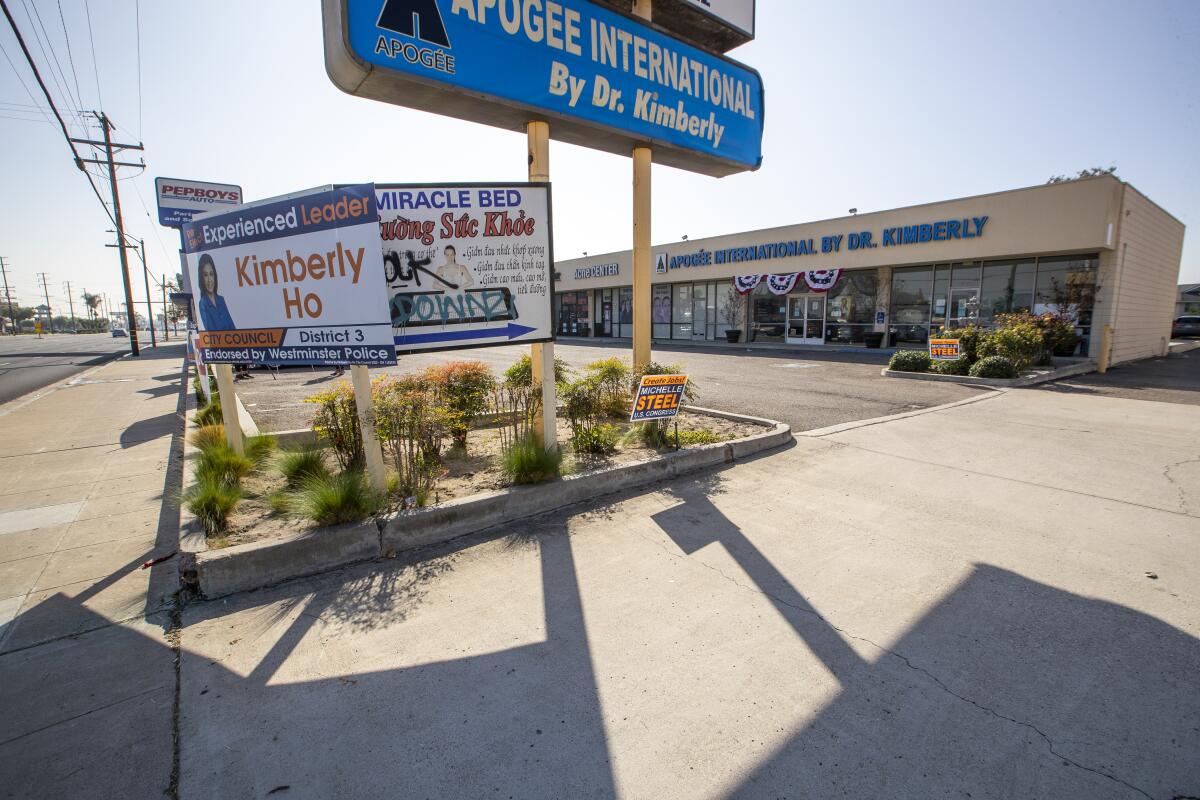
Some immigrant voters say they rely on assistance from such centers, and in past election seasons, volunteers have offered visitors servings of sticky rice, cake and fresh tea. Retiree Tony Dinh, a former maintenance worker from Westminster, said he stopped by one location once and found it “very welcoming.”
“A lot of the staff are bilingual so they understand all the regulations. I did not receive my mail ballot and I gave them my ID number and they were able to go online and find it for me. It’s much quicker than waiting so long on the phone,” he said.
Even Ho’s opponent, Westminster Councilman Tai Do, seemed to accept the general idea of the center, which he described as part of a tradition of grassroots efforts to ignite community political participation. “Voting is a complicated issue and of course, the elders may need a lot of guidance,” he said.
However, he added: “I don’t have any evidence, but naturally, when someone comes to your center and asks for your help, people have a tendency to steer them to the candidate they support. Is that wrong? It’s up to the rule book.”
With all precincts reporting Wednesday, Ho had defeated Do 64% to 36%. The two incumbents faced each other as a result of redistricting, after Ho survived a recall attempt in April.
Orange County Registrar of Voters Neal Kelley said he asked the Ho campaign to take down signs identifying the voting site because he thought they could mislead voters into thinking it was an official polling location.
The sign Ho’s campaign removed translated to either “polling place” or “ballot room” in Vietnamese; the same phrase was used for official locations on the Vietnamese language websites for the Orange County Registrar of Voters and the Los Angeles County Registrar. Another handwritten sign scrawled in black marker read, “Vote here.”
“There were different interpretations of what the sign was implying, whether it was saying to stop here and vote,” Kelley said. “My main concern was confusing the voters.”
He referred the matter to the Orange County District Attorney’s Office to investigate whether any crimes occurred.
“I’m not making any judgment. It’s in the hands of the D.A.,” Kelley said.
Kimberly Edds, spokeswoman for the D.A.’s office, said so far investigators concluded that ballots received at the site were not being “discarded or destroyed,” but that officials are still looking into “whether any other illicit activity was occurring.”
As the U.S. presidential vote failed to swiftly yield a clear winner, a watching world responded with worry, disbelief and a measure of scorn.
Jessica Levinson, a professor at Loyola Law School, said the signage at the campaign headquarters “certainly does give the impression that it’s a voting center,” and that it’s “dancing on misrepresentation.”
“To me, ‘ballot room’ gets really close to official polling place,” she said.
Levinson said it’s illegal for anyone to misrepresent themselves as an election official. So far, it looks as if they may have walked up to the line of illegality, but it’s unclear whether they crossed it, she said.
“If they say, ‘Hi. I’m a poll worker, how can I help you?’ Then we have a problem,” she said.
Levinson said this, along with ballot boxes that GOP officials in California placed around the state, are “testing the boundaries of our elections laws and seeing where they’re going to break.” State Republican officials said they removed “official” signs placed on some of the boxes, and a judge said the party did not have to disclose information about the program to Atty. Gen. Xavier Becerra.
A former Republican state assemblyman, Tran denied that voting took place in the office. He said ballots were dropped off and then taken to county election offices or nearby official ballot drop-off boxes.
For weeks, radio and television advertisements ran in Vietnamese media across Southern California promoting the location.
“The official polling places have opened. Together let’s go vote to express our voice,” said one television ad in Vietnamese. The ad gave the address for the strip mall, calling it an “election office.”
Funding for the advertisement came from state Assemblyman Tyler Diep (R-Westminster), a friend of Ho’s who also mounted a campaign for separate seats on the Municipal Water District of Orange County and the Midway City Sanitation District. Diep said he spent about $6,000 to run ads on Little Saigon Radio, Vietnam California Radio (VNCR) and Viet Face TV.
Diep said many of the elderly visitors wanted to deliver their ballots in person “because they don’t know where their drop-off box is and because they were skeptical about mailing it in, after seeing the integrity of the U.S. Postal Service compromised, perhaps, in candidate statements.”
After the barrage of advertisements, voters may have been under the impression that the strip mall was an official polling site.
Shortly after 7 p.m. on Tuesday, a woman arrived looking to vote before the 8 p.m. cutoff, according to Andrea Bird-Steiner,
a volunteer attorney monitoring the election for Common Cause and Indivisible OC 48.
When Bird asked if she had a ballot, the woman said, “Mine apparently got lost in the mail or something. I’ve been waiting for it but it hasn’t come,” according to a video Bird provided. Bird directed her to an official polling location nearby.
As 8 p.m. approached, Bird said that Westminster police ordered her to leave the strip mall parking lot or face arrest for trespassing.
Many voter integrity questions remained, Bird said. She provided The Times with a photograph of what appeared to be a ballot’s inner envelope that had been discarded at the site.
“Did these ballots ever actually make it to the polls?” said Bird. “What questions were people asked when they went in? Were they asked what political parties they were with? Was there voter intimidation happening in there to vote a certain way because they were being told to?”
More to Read
Start your day right
Sign up for Essential California for news, features and recommendations from the L.A. Times and beyond in your inbox six days a week.
You may occasionally receive promotional content from the Los Angeles Times.
